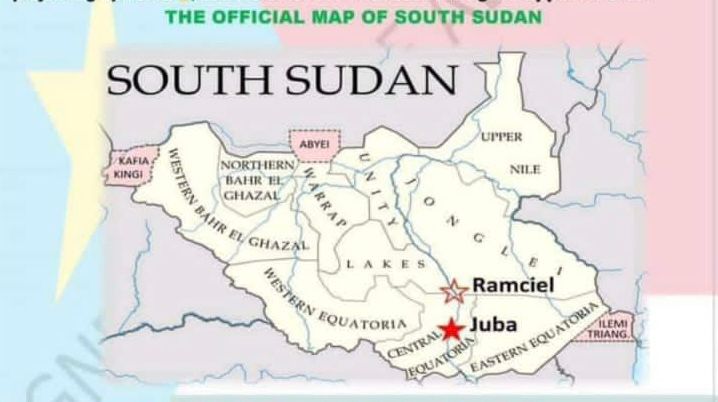South Sudan gained its independence from Sudan on 9 July 2011, becoming the world’s youngest nation. This followed decades of struggle by South Sudanese and other oppressed people of Sudan against successive regimes in Khartoum.

South Sudan is a land-locked country with an area of 644,329 sq. km located in eastern central Africa. Following independence, it joined the community of nations as the 193rd member of the United Nations and the 54th member of the African Union.
The Republic of South Sudan is bordered by six other African countries: Sudan in the north, Ethiopia in the east, Kenya in the southeast, Uganda in the south, the Democratic Republic of Congo in the Southwest and the Central African Republic in the west.
It is a multi-ethnic, multi-cultural, multi-lingual, multi-religious and multi-racial society made up of 64 tribes.
South Sudan follows a presidential political system. The President is both the head of state and government. The country’s 10 states and three administrative areas are governed on the basis of a decentralized democratic system.
In line with the Revitalized Agreement on the Resolution of the Conflict in South Sudan (R-ARCRSS), there are five vice presidents. Each presides over a ministerial cluster: the governance, economic, service, infrastructure, as well as youth and women clusters. There is also a ministry for cabinet affairs.
South Sudan has an independent judiciary.
It also boasts a dual judicial system that administers justice through a cornucopia of statutory and customary law courts spread across the country, although the Constitution itself adopted the English Common Law as the country’s legal system.
Both statutory and customary law courts operate alongside each other with the statutory courts mostly found in urban settings and the customary courts existing predominantly in rural areas.
However, it’s not uncommon to find the two systems existing concurrently in either urban or rural areas.
The Judicial System in South Sudan, like in many countries in the region and around the world, comprises several tiers.
The first tier, the Supreme Court, is the highest court in the land. The second tier comprises the Courts of Appeal, followed by the High Courts and then the County Courts.
Under these, there are also other smaller courts and tribunals, which may be established according to need.
The country has a bicameral National Legislature that consists of an Upper House or the Council of States, and a Lower House or the National Legislative Assembly, which were both established in line with the 2018 Revitalized Agreement on the Resolution of the Conflict in South Sudan (R-ARCSS).
Membership in these Houses include the Sudan People’s Liberation Movement in Government (SPLM-IG) as the majority party, followed by the Sudan People’s Liberation Movement in Opposition (SPLM-IO) and then other political organizations that are party to the R-ARCSS.
Unfortunately, like many other countries in the world, South Sudan remains vulnerable to climate change. For South Sudan, this has only exacerbated humanitarian conditions for millions of people.
The country continues to struggle with an array of environmental issues such as water pollution, wildlife conservation, loss of vegetation covers and biodiversity, flooding and periodic droughts.
The main tributary of the River Nile, the White Nile, passes through South Sudan, forming an expansive swamp commonly referred to as the Sudd region. The Sudd, located in Jonglei State, is the world’s largest swamp.
South Sudan’s highest point is Mt. Kinyeti in Eastern Equatoria State at 10,456 ft. or 3,187 m above sea level and its lowest point is the White Nile at 381 m.
The country receives a reasonable amount of rainfall, mostly between May and November. May used to be the wettest month of the year, with July considered to be the coolest, when temperatures drop to around 20° C.
With temperatures hovering in the neighborhood of 40° C, the month of March remains one of the hottest months of the year.
South Sudan’s mineral resources remain largely unexplored and untapped.
Certain estimates suggest that the country is rich in mineral resources such as gold, diamonds, petroleum, hardwoods, limestone, iron ore, copper, chromium ore, zinc, tungsten, mica and silver.
Despite efforts by the government to diversify the economy, South Sudan’s economy continues to be predominantly an oil-based economy.
Conflict, devastating floods, the COVID-19 pandemic and now the war in Ukraine have all hampered efforts by the government to effectively deliver infrastructure and socio-economic services to the people as planned.
Unfortunately, this means that South Sudan continues to be a net importer of many consumer goods and products.
Most imports – cars, lorries, pharmaceuticals, electronics, foodstuffs and clothing – come from the United Arab Emirates, China and Kenya.
The signing of the R-ARCSS in September 2018 and the formation of a Transitional Government of National Unity in February 2020 are contributing positively towards economic recovery and peacebuilding.
The government has also undertaken a series of reforms in line with the Agreement that are meant to support longer term stability and development.
A two-year extension of the R-ARCSS to February 2025 will further allow the government to meet key milestones in the peace agreement.
Fortunately, there is broad consensus among the peace partners in the government that full implementation of the R-ARCRSS, strengthening of government institutions, particularly those related to public financial management, the rule of law, good governance and service delivery, will be critical as the government endeavors to consolidate peace, build resilience against future shocks and embark upon a path of sustainable economic growth.
gggggg
The vision of the Ministry of Justice and Constitutional (MoJCA) is “To lay and build a strong foundation for a united, peaceful and prosperous South Sudan based on Justice, equality, respect for human rights and supremacy of the rule of Law.”
Location:
Airport Road, Opposite Juba Hotel & Next to Ministry of Education, Central Equatoria
Email Us:
communications@mojca.gov.ss
© Copyright. Ministry of Justice and Constitutional Affairs (MoJCA). 2023. All Rights Reserved.